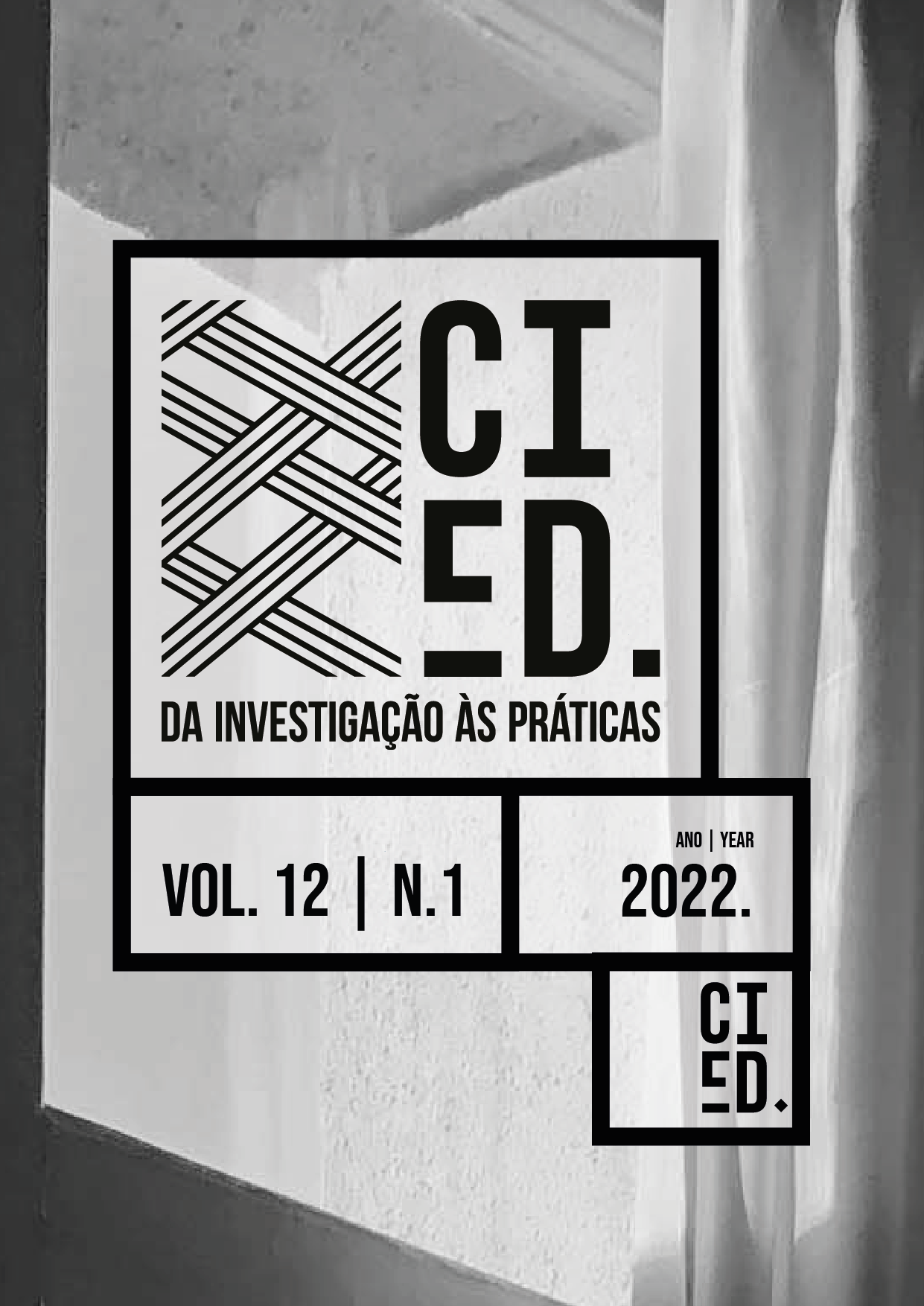Classroom or newspaper office?
A citizen curriculum experience
DOI:
https://doi.org/10.25757/invep.v12i1.310Abstract
In the century following the seminal works of Kilpatrick (1918) and Freinet (1976), pedagogical actions in dialogue with the concepts of 'project work' and 'school newspaper' remain fundamental.
From this perspective, this paper presents the results of a research based on the following question: What opinions do 2nd cycle of basic education students have about the experience of creating a school newspaper? An experience that involved two classes of 5th grade and one of 6th grade, in the school year 2020/21, in a private Portuguese school.
As main results we highlight, on the one hand, the consensual recognition of 'project-based teaching' as a relevant practice for students' learning and, also, for the development of social interaction skills; and, on the other hand, the justified acknowledgment of the potential of such curricular option in the promotion of children and young people's autonomy and self-determination.
Downloads
References
Amado, J. (2014). Manual de investigação qualitativa em educação. Coimbra: Imprensa da Universidade de Coimbra. doi:10.14195/978-989-26-0879-2
Amor, E. (2006). Didáctica do Português. Fundamentos e Metodologia (6.ª ed.). Lisboa: Texto Editora
Aoki, T.T. (2005). Curriculum in a new key: the collected works of Ted T. Aoki. (W.F. Pinar & R.L. Irwin, Eds.) New Jersey: Lawrence Erlbaum Associates.
Apple, M.W. (2019). Ideology and curriculum. New York: Routledge
Arendt, H. (2019). Pensar sem corrimão. Lisboa: Relógio D'Água
Bauman, Z. (2009). A sociedade individualizada: vidas contadas e histórias vividas. (J. Gradel, Trad.). Rio de Janeiro: Jorge Zahar Editor
Bardin, L. (2011). Análise de conteúdo (4.ª ed.). Lisboa: Edições 70
Barton, K. & Levstik, L. (2004). Teaching History for the common good. Mahwah, NJ: Lawrence Erlbaum Associates
Biesta, G. (2017). The rediscovery of teaching. New York: Routledge
Biesta, G. (2020). The three gifts of teaching: Towards a non-egological. Journal of Moral Education, 1-16. doi:10.1080/03057240.2020.1763279
Camps, A. (2003). Secuencias didácticas para aprender a escribir. Barcelona: Graó
Colomer, T. & Teberosky, A. (2003). Aprender a Ler e a Escrever. Porto Alegre: ARTMED
Denzin, N. & Lincoln, Y. (2012). Manual de investigación cualitativa. El campo de la investigación cualitativa. Barcelona: Gedisa
Duarte, P. (2021). Pensar o desenvolvimento curricular: uma reflexão centrada no ensino. Porto: Escola Superior de Educação do Porto
Esteves, M. (2006). Análise de Conteúdo. ln J.A. Lima & J. Pacheco (Orgs.), Fazer Investigação: Contributos para a elaboração de dissertações e teses (pp. 105-126). Porto: Porto Editora
Freinet, C. (1976). As Técnicas Freinet da Escola Moderna. Lisboa: Editoral Estampa
Freinet, C. (1991). Pedagogia do bom senso (3.ª ed.). São Paulo: Martins Fontes
Gimeno Sacristán, J. (2015). El currículum como estudio del contenido de la enseñanza. In Ensayos sobre el currículum: Teoría y práctica (pp. 22-62). Madrid: Morata
Gimeno Sacristán, J. & Pérez Gómez, Á.I. (2008). Comprender y transformar la enseñanza (12.ª ed.). Madrid: Ediciones Morata
Giroux, H.A. (2018). The Public in Peril: Trump and the Menace of American. Routledge: New York
Giroux, H. A. (2021). Race, politics, and pandemic pedagogy: education in Time of Crises. London: Bloomsbury
Imbernón, F. (2012). Pedagogia Freinet - A atualidade das invariantes pedagógicas. Porto Alegre: Grupo Penso
Kemmis, S. & Edwards-Groves, C. (2018). Understanding Education: History, Politics and Practice. Singapore: Springer. doi:10.1007/978-981-10-6433-3
Kilpatrick, W.H. (1918). The Project Method. Teachers College Record, 19, 319-334
Kilpatrick, W.H. (1921). Dangers and Difficulties of the Project Method and How to Overcome Them: I. Introductory Statement: Definition of Terms. Teachers College Record, 22(4), 283-287
Korczak, J. (1997). Como amar uma criança. Rio de Janeiro: Paz e Terra.
Laur, D. (2013). Authentic learning experiences : a real-world approach to project-based learning. Routledge: New York
Lee, P. (2016). Literacia histórica e história transformativa. Educar em Revista, 60, 107-146
Moreira, A.I. (2020). Para uma aprendizagem histórica: dos mitos aos desafios. Revista História Hoje, vol.18, n.9, 101-124
Morin, E. (2005). Introdução ao pensamento complexo. Porto Alegre: Meridional
Nussbaum, M.C. (2012). Not for profit: why democracy needs the humanities. Princeton: Princeton University Press
Onuora-Oguno, A.C. (2019). Development and the Right to Education in Africa. Palgrave: Cham. doi:10.1007/978-3-319-90335-4
Osler, A. (2011). Teacher interpretations of citizenship education: national identity, cosmopolitan ideals, and political. Journal of Curriculum Studies, 43(1), 1-24. doi:10.1080/00220272.2010.503245
Pecore, J.L. (2015). From Kilpatrick’s project method to project-based learning. Em M. Y. Eryaman, & B. C. Bruce (Edits.), International handbook of progressive education (pp. 155-171). New York: Peter Lang
Rodari, G. (2017). Gramática da fantasia. Coimbra: Faktoria K de Livros.
Rosales López, C. (2009). Didáctica: Innovación en la Enseñanza. Santiago de Compostela: Andavira
Torres Santomé, J. (2017). Políticas educativas y construcción de personalidades neoliberales y neocolonialistas. Madrid: Ediciones Morata
UNESCO. (2021). Reimagining our futures together: a new social contract for education. Paris: UNESCO: United Nations Educational, Scientific and Cultural Organization
Verma, R. (2017). Critical Peace Education and Global Citizenship: Narratives From the Unofficial Curriculum. New York: Routledge
Downloads
Published
How to Cite
Issue
Section
License
Copyright (c) 2022 Ana Isabel Moreira, Pedro Duarte

This work is licensed under a Creative Commons Attribution 4.0 International License.
Articles published or submitted to Da Investigação às Práticas are licensed according to Creative Commons Attribution License (CC BY 4.0). Authors agree that:
Copyrights of all articles published are retained by authors with first publication copyright granted to the journal.
All articles are under the Creative Commons Attribution License recognizing the authorship of the publication and identifying that first publication took place in this journal.
Authors have the right to free distribute or make available in private or institutional pages the version published by Da Investigação às Práticas: Estudos de Natureza Educacional provided the original proper citation.
The journal only accepts articles not published previously (except in the form of an abstract or as part of academic thesis), that it is not under consideration for publication elsewhere. After published, the article cannot be published again partial or totally without the editorial board consent.





 e-ISSN: 2182-1372
e-ISSN: 2182-1372